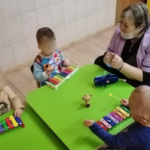‘The Last Udmurt’

he self-immolation of Albert Razin on September 10 intended to attract attention to the problems of the Udmurt language has certainly done that, but it has also drawn enormous attention to the man himself. One of the most moving is a commentary of Galina Sakharevich on Moscow’s Takiye dela portal.
She visited Udmurtia and the places where the scholar and activist had lived to learn who this man, whom his admirers call “the last great Udmurt,” had lived and reached the decision that his only recourse was to take his own life in the name of his people and his language.
Sakharevich attended Razin’s funeral. Most of the participants were older and female, and all of them spoke Udmurt rather than Russian. At the site, there was a picture of the scholar and to the left of it, a placard with the slogan he had had with him at the time of his suicide: “If tomorrow my language will disappear, then I am prepared to die today.”
People in Razin’s native Kuzyumov were divided by Razin’s suggestion that his ashes be scattered as that is not in the Udmurt tradition many of them understand. Many told Sakharevich that they couldn’t imagine how they would gather apples if his ashes were spread on the grounds there.
But most, including his family, were ready to support his wishes, and they were carried out. In the words of one villager, “this was a great man for Kuzyumov;” and if he wanted his ashes scattered that is what should happen. In fact, it did, with the wind spreading them quickly over the area.
About 400 people live in Kyzyumov. Most young people have moved away, but those who remain knew Razin and were eager to share their memories. “The overwhelming majority of the population are Udmurts, the journalist says; and each knew well one or more aspects of Udmurt history and its trials and tribulations.
“Each street has its own, classically Soviet name – Central, Collective Farm, or Labor, but residents call them in their own way in Udmurt, Sakhareva says. They remember Albert Razin and his siblings, who were named Revo and Lyutsa, the first of whom for “the Revolution,” as were many there.
One of Razin’s more distant relatives recalled that the late scholar called himself a Tolsstoyan and liked to recall Talleyrand’s phrase that “my enemies have taught me much more than my friends.” And they take pride that Razin unlike most who got an education returned home and worked for Udmurtia despite opportunities in Moscow or even abroad.
In the 1990s, Razin became a professor at Udmurt State University and headed its laboratory of ethnic relations. That laboratory was subsequently closed to save money; but he continued to work in the university’s humanities institute and also in the republic’s Union of Scholars of Udmurtia.
But even as he made an academic career, his friends and family say, Razin was more powerfully affected by and drawn to ancient Udmurt culture. “Of the 37 sacred places” in the republic, 21 were in the region where his native village was situated. He believed in the old faith, one that was relatively underdeveloped and lacked many features found in the paganism of the Mari or the Chuvash, something he regretted and as a priest tried to change.
“A key distinguishing feature of the faith of the Udmurts,” Sakharevich says, “is that there are no special rules in it, no precise words for prayers or clearly formulated customs. Many scholars consider this an indication that the religious culture of the Udmurts has not yet been fully formed.”
Razin sought to address that, reviving the practice of the Gerber festival in 1992 – it has now spread throughout the republic – and praying every day. And to promote the faith and its role in the national revival of the Udmurts, he organized the Udmurt Kenesh organization (“the Council of the Udmurts”).
He attracted many followers via that device but he also alienated some of the other Udmurts who felt he was too radical. As a result of their actions, he was gradually pushed out of the organization and acted increasingly on his own. It was at this time that he turned his focus primarily to the issue of language, especially since ever fewer Udmurts speak it.
With Putin’s 2018 call to eliminate the requirement that the titular languages of the peoples of the non-Russian republics be studied as a required subject, Razin felt his time was running out. He seldom slept, preferring instead to write, and he sought to transfer his priestly duties to others, even though in the old faith, that could happen only on his death.
Many Udmurts are proud of what Razin did, but perhaps equally many are uncertain as to whether others will try to carry on his work, Sakharevich says. But there is one positive sign: every day people leave flowers at the place where he committed suicide by self-immolation, and every night, the powers that be take them away.
But every morning, the flowers and a picture of the many they are laid in order to honor somehow reappear.
Paul Goble, Window on Eurasia


Leave a Reply